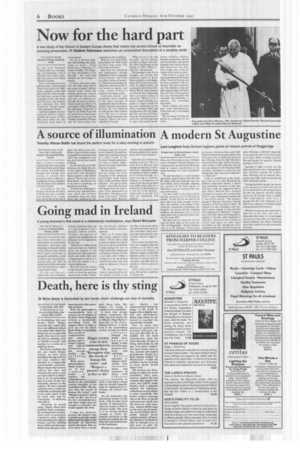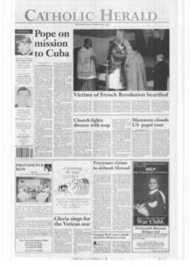Page 6, 6th October 1995
Page 6

Report an error
Noticed an error on this page?If you've noticed an error in this article please click here to report it.
Tags
Share
Related articles
Saint Mug Stars In Literary Galav
Oldie Honours Longfords Frank And Elizabeth Longford Were...
Malcolm Muggeridge And His Causes
By Malcolm Muggeridge
Decline And Fall
A modern St Augustine
Lord Longford finds Richard Ingrams paints an honest portrait of Muggeridge Muggeridge by Richard Ingrains, Harper Collins, £20 MALCOLM MUGGERIDGE was a brilliant writer of English. Richard Ingrams is a very good one, and this book will always rank as a major contribution to the understanding of a truly remarkable man.
Though belonging to a much younger generation, Ingrains knew Malcolm well for many years and Malcolm was very fond of him. In his biography, Ingrams has explored all the main aspects of Malcolm's long and variegated life with care and honesty.
The last words in the book will be warmly welcomed by all Malcolm's friends: "In the end for me and for all those who were lucky enough to know him, the memory will remain of his endlessly stimulating friendship, the laughter, the gossip and his unfailing kindness and generosity. It is to try to repay what I owe to him that I have written this book. RIP."
But that does not mean that the last step has been taken in the search for "the real Muggeridge". Richard Ingrams tells us in the Epilogue "Some years previously Malcolm had asked AJP Taylor to deliver his funeral address but it was not to be, as Taylor pre-deceased him. Proving, however, that Malcolm's hunch had been right. Taylor had previously written, (while Malcolm was still alive) an obituary for The Guardian which somehow managed to catch the real Muggeridge better than any of Malcolm's co-religionists."
I must be careful here as the co-religious who in the event delivered the address at Malcolm's funeral. I cannot help wondering, however, at what date Malcolm made the suggestion about Alan Taylor. Malcolm was a declared Christian for a quarter of a century. Alan Taylor's views would have sounded odd in the parish church. "The greatest change in Malcolm," he wrote, "was his discovery of God and Jesus Christ. All religion is to me a buzzing in the ears, and I cannot explain or even describe what happened to Malcolm." I sympathise with Alan Taylor not being able to explain or describe what happened to Malcolm. Christians are entitled to believe that grace in some sense descended on him. Seeing him every weekend at the time when he became an active Christian, I still find it impossible to say precisely when it was that he gavt up women, drink, smoking, meat am fish and became the greatest Christiar apologist of his time.
Ingrams is right to point out tha Malcolm had had, since undergraduate. days, Christian longings. He confirm: what Malcolm told me himself: that i was his way of life which stood in the wa3 of his spiritual progress.
Perhaps inevitably, though, the accoun of the last quarter of Malcolm's life wil be overshadowed by the irregularities o the first two quarters. Already a major review in The Sunday Times is header "Not a Safe Man in a Taxi". It is at though the life of St Augustine or Si Paul were evaluated on the basis of thei3 unregenerated performances.
Which of us can say that their view o: Malcolm is the only real view o: Malcolm? But some of us will always see him as a man who, as I said in m) funeral address, was always conscious of another world and in the end another Presence.
blog comments powered by Disqus













